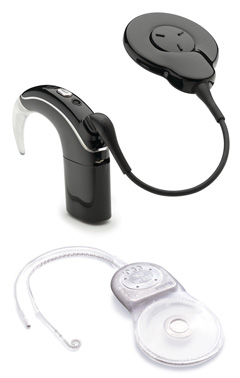Beyond Hearing aids. Discover the science behind Cochlear implants.
 If hearing aids are no longer effective for you or your child, cochlear implants might be the answer. Cochlear implants are surgically implanted medical devices that treat hearing loss. The implant allows those with severe hearing impairment the ability to hear and understand speech.
If hearing aids are no longer effective for you or your child, cochlear implants might be the answer. Cochlear implants are surgically implanted medical devices that treat hearing loss. The implant allows those with severe hearing impairment the ability to hear and understand speech.
It’s been called a life changer. It’s been called a miracle. We call It a cochlear Implant. When a crucial part of your inner ear isn’t working properly, you may need more than a traditional hearing aid. You may need a cochlear implant to treat your moderate to profound hearing loss. The Cochlear™ Nucleus® System mimics the natural hearing function of the inner ear to help make sounds clearer. A cochlear implant bypasses the damaged part of the ear so sounds are better understood in both noisy and quiet environments, enabling you to hear everything from conversations in busy restaurants to leaves rustling in the wind.
A cochlear implant can work alongside hearing aids or in place of them. The implant is an electronic device that is designed to compensate for the damaged part of the inner ear, called the cochlea, and provides vital sound signals to the brain. This is opposed to simply making sounds louder, which is how hearing aids generally work. Although the implants do not actively cure hearing loss, they provide the wearer with the sensation of sound.
The implant has two parts. One is an external processor placed behind the ear. The other is an internal receiver device that is implanted inside the ear. The processor is designed to pick up the sound and convert it to electrical signals, which is then picked up by the receiver and converted into electrical impulses, which give the sensation of sound.
The most significant benefit of cochlear implants is the heightened sensation of sound, which makes hearing and speaking feel more natural.
Other benefits include:
- Hearing conversations and environment sounds at a comfortable level
- Distinguishing and identifying different types of sound
- Being able to keep your voice at a comfortable level for yourself and for others
- Being able to speak on the phone or listen to music, radio and podcasts
Both adults and children as young as 12 months can have cochlear implants. They are particularly useful for those who were born deaf or have severe hearing loss. It is recommended that children receive the implants as soon as possible to have access to sounds for speech and language development.
Through time and training, the brain learns to interpret the electrical impulses received from a cochlear implant. Studies show that within a year, people with cochlear implants can understand sentences 8 times better than they could previously with just hearing aids.
To learn more about cochlear implants, or to see if you or a loved one is a good candidate for this type of hearing solution, contact our office for a consultation.
